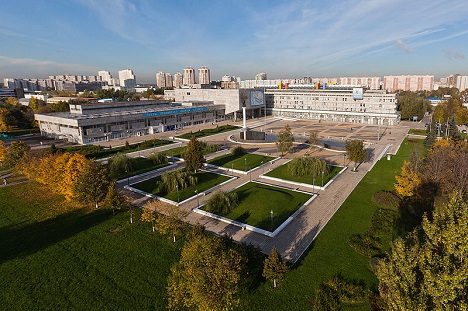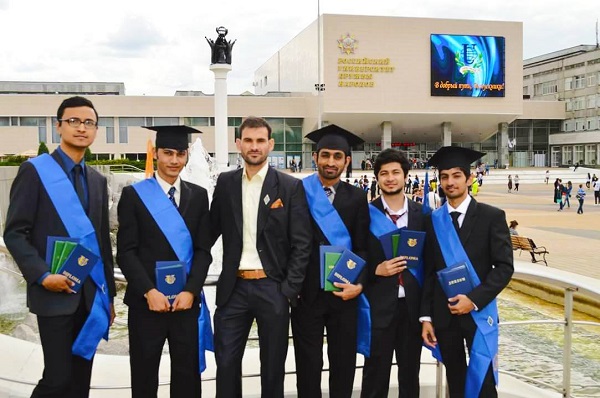
RUDN main building in Moscow. Source: Romanyel / wikipedia.org
Medicine
Medicine tops the list of educational areas Indian students choose to study. Established in 1961, the RUDN Institute of Medicine today has more than 4,500 students on its rolls. Graduates from the Institute work in over 110 different countries.
The institute has laboratories with modern diagnostic and research equipment and teaching departments affiliated to 10 Moscow hospitals. This allows the students to acquire real work experience in therapeutics, surgery, traumatology, gynaecology, ophthalmology, and other fields of Medicine. Due to the development of telemedicine, students can remotely observe the surgical procedures held both in Russia and other countries.
Geology
Future geologists who are Master’s (graduate) students at the Faculty of Engineering have the choice of two specialisations in which Russia leads the world. These are innovative technologies for solid minerals exploration and technologies for oil and gas exploration. These programmes include advanced courses in remote forecasting, mathematical processing of various geological information data. Students can do their internships in such companies as Rosneft, Gazprom, RUSAL, and Norilsk Nickel.
Civil Engineering & Construction
‘Unique Structures’ Master’s (graduate) students in the Civil Engineering field are offered four programmes, one of which is a programme taught in English, called “Computing and construction engineering”. Apart from full-time teachers and faculty at RUDN, the best Russian specialists are invited to teach specialised professional courses (reconstruction, mathematical modelling, information technologies, in civil engineering, technical equipment reliability, among others). Among the invited teaching staff are representatives of the Central Scientific Research Institute for Building Structures, which participated in building the 540-metre high Ostankino TV Tower in Moscow, and in constructing the bridge to Russky Island in the Far East of Russia (built before the 2012 APEC Summit).
Mathematics for Outer Space
Mathematicians are trained in two basic departments: the Department of Applied Mathematics and the Department of Probability Theory and Mathematical Statistics. Students are offered fundamental training in Mathematics and Computer Sciences, and they also study Applied Mathematics, or information technologies in the sphere of finance, insurance, investment business, aerospace, and others. Students are engaged in research work, and are provided opportunities to do their internships at leading universities in Germany, Italy, France, among other countries.
Solar Wind Physics
Physicists are trained at two main departments: the Department of Applied Physics and the Department of Theoretical Physics and Mechanics. Students are taught by researchers from the leading centres for Physics in Russia, including the Lebedev Physics Institute; which counts four Nobel laureates among its alumni; the Space Research Institute, which focuses on studying the physics of planets, space, weather, and solar winds; and the Joint Institute for Nuclear Research and the Kurchatov Institute.
An Indian student, Tabrez Khan, who graduated in Engineering (completing a Bachelors degree in Civil Construction Engineering from People’s Friendship University of Russia on a scholarship given by the Russian Ministry of Education and Science) and is continuing his Masters programme in Civil Engineering and Management, had a warm feedback to share about his experience.
 Tabrez Khan (third from left). Source: Personal archive
Tabrez Khan (third from left). Source: Personal archive
“I feel myself very lucky to study in this prominent world class university RUDN,” Khan said.
“RUDN is a unique international university of Russia where more than 90% Indian students want to enroll their names every year, especially in the fields of engineering and medicine,” Khan told RIR.
“As far as the Level of Teaching is concerned, here it is more practical in comparison to the Indian study system. Engineering students do not have much burden in theoretical aspects Here,” Khan said. “Every year, a lots of students have dreams to study Civil Engineering in India, but because of the high level of competition and fewer seats, students are opting for admission to other fields. I think they should apply to study in RUDN and get a good knowledge experience and DIPLOMA in their perspective field,” Khan said.
“The time I spent at the University has not only given me professional knowledge, but also skills of interacting with people from all corners of the world, with different languages and cultures. I got skills of working in a multinational team,” Khan told RIR.
Speaking about the facilities available to students on the RUDN campus, Khan said, “as far RUDN facilities and atmosphere are concerned, we have a student’s city we call ‘Studentiski Gorodok,’ with hostels, academic buildings, Polyclinic, libraries, Police Station, International house of Culture, Cafes and Pubs inside the campus. The university is also keen about the students’ safety. There is a checkpoint system and round-the-clock video supervision across the campus area, for security, but nothing to hinder students' comfortable living,” the Indian student said.
“RUDN Campus is one of the best places of study and leisure. After lectures and on days-off, students can relax and spend time with friends at numerous cafes and coffee-houses. There are plenty of them; Indian, Chinese, Arabic, African, Georgian; these are found in every block of hostels; more than 25 in all,” he said.
“The fact that every year the university has students from 145-150 countries marks it out as a highly reputable educational institution, whose diplomas make graduates competitive in the labour market, giving them a chance to became good Engineers, Doctors, state and political figures, members and even heads of their governments and parliaments,” Khan said.
All rights reserved by Rossiyskaya Gazeta.
Subscribe
to our newsletter!
Get the week's best stories straight to your inbox